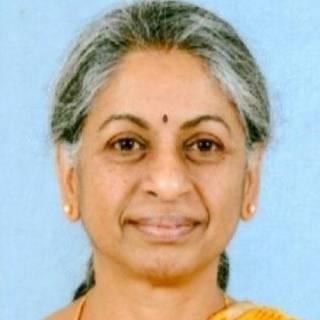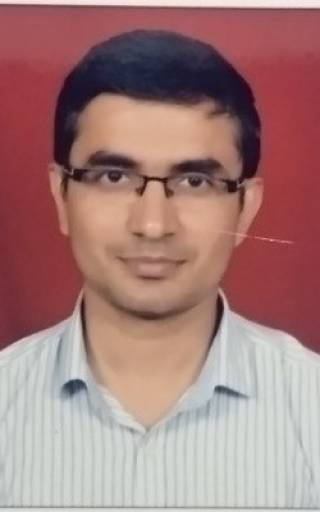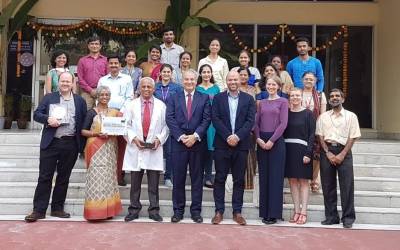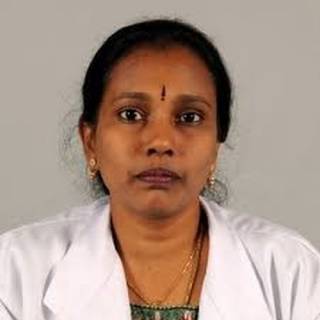The ICGNMD is fortunate to have two separate collaborations with NIMHANS, a government-funded, multi-disciplinary clinical-academic institute specialising in mental health and neurosciences.
NIMHANS Collaboration 1:
Centre Co-Principal Investigator:
Dr Gayathri N, Professor, Neuromuscular Laboratory, Departments of Neuropathology and Neurology

Centre Co-Principal Investigator and ICGNMD Faculty PI Fellow
Dr Nandeesh BN

Centre Co-Investigator and ICGNMD Faculty PI Fellow
Dr Madhu Nagappa
- Clinical neuromuscular expertise, patients, and geographical region:
NIMHANS (http://www.nimhans.ac.in/) is an institute of national importance for patient care and academic research in mental health and neurosciences. NIMHANS caters for patients from all over India, particularly from the State of Karnataka and South India, and neighbouring countries. A committed team of neurologists with years of expertise routinely handle neuromuscular disorders. Around 800-900 NMD patients are referred to NIMHANS each year. Over one hundred patients with mitochondrial disorders and inherited neuropathies undergo thorough clinical evaluation followed by electrophysiology and imaging annually. A speciality clinic for neuropathies is run every week for providing comprehensive care including rehabilitation measures. A specialty clinic for patients with mitochondrial disorders is under development.
- Genetics and preclinical science expertise and facilities:
NIMHANS has several basic science departments. The department of Neuropathology, the only one of its kind in the country with full-time experienced and dedicated neuropathologists offers comprehensive and advanced diagnostic services in muscle and peripheral nerve disorders, mitochondrial disorders, among others and has facilities for ultrastructural studies. NIMHANS has the Neurobiology Research Centre (http://www.nimhans.ac.in/neurobiology-research-centre-nrc), a core research facility with 18 well-equipped state-of-the-art labs including the Neuromuscular Laboratory which is the research arm of the department of Neuropathology. It houses the 'myo-bank', and has the expertise and infrastructure for sequencing, respiratory chain complex assays, western blots, immuno-diagnosis, cell culture work, etc.
- Summary of Professor Gayathri, Dr Nandeesh and Dr Nagappa’s current research:
Work at NIMHANS in the last decade has created an effective platform for research in the field of mitochondrial disorders and inherited neuropathies. Our centre is one of the first in India to identify several novel variants in mitochondrial DNA, evaluate children and adults with deficient respiratory chain complex activity, explore nuclear-mitochondrial intergenomic communication disorders, characterize POLG-related disorders, carry out focused exome sequencing, study the utility of FGF-21 and initiate generation of cybrid models. Two large cohorts of inherited axonal and demyelinating neuropathies have been analysed for the presence of abnormalities in common genes, namely MFN2, PMP22, MPZ and GJB1.
- Professor Gayathri: a selection of 5 papers from the past 5 years:
Bindu PS, Sonam K, Chiplunkar S, Govindaraj P, Nagappa M, Vekhande CC, Aravinda HR, Ponmalar JJ, Mahadevan A, Gayathri N, Bharath MS, Sinha S, Taly AB.Mitochondrial leukoencephalopathies: A border zone between acquired and inherited white matter disorders in children? MultSclerRelatDisord. 2018, 20:84-92.
Khan NA, Govindaraj P, Soumittra N, Sharma S, Srilekha S, Ambika S, Vanniarajan A, Meena AK, Uppin MS, Sundaram C, Bindu PS, Gayathri N, Taly AB, Thangaraj K.Leber's Hereditary Optic Neuropathy-Specific Mutation m.11778G>A Exists on Diverse Mitochondrial Haplogroups in India.Invest Ophthalmol Vis Sci. 2017, 58:3923-3930.
Sonam K, Bindu PS, Srinivas Bharath MM, Govindaraj P, Gayathri N, Arvinda HR, Chiplunkar S, Nagappa M, Sinha S, Khan NA, Nunia V, Paramasivam A, Thangaraj K, Taly AB.Mitochondrial oxidative phosphorylation disorders in children: Phenotypic, genotypic and biochemical correlations in 85 patients from South India.
Mitochondrion. 2017, 32:42-49.
Bindu PS, Govindaraju C, Sonam K, Nagappa M, Chiplunkar S, Kumar R, Gayathri N, Bharath MM, Arvinda HR, Sinha S, Khan NA, Govindaraj P, Nunia V, Paramasivam A, Thangaraj K, Taly AB.Peripheral neuropathy in genetically characterized patients with mitochondrial disorders: A study from south India.
Mitochondrion. 2016, 27:1-5.
Bindu PS, Arvinda H, Taly AB, Govindaraju C, Sonam K, Chiplunkar S, Kumar R, Gayathri N, Bharath Mm S, Nagappa M, Sinha S, Khan NA, Govindaraj P, Nunia V, Paramasivam A, Thangaraj K.Magnetic resonance imaging correlates of genetically characterized patients with mitochondrial disorders: A study from south India. Mitochondrion. 2015, 25:6-16.
- How the ICGNMD will benefit research and clinical programmes:
The ICGNMD will enable detection of population-specific genetic variations among patients with mitochondrial disorders and hereditary neuropathies as well as comparison across continents through common pipelines. Further, this will set platform for future collaborative studies in this field including functional characterisation. Establishing genetic diagnosis may end a diagnostic odyssey for some participants and enable customised care. The ICGNMD award will additionally generate a cadre of fellows and scholars with the necessary expertise to carry forward clinical and research work in a sustainable manner. It will also facilitate setting up registries and trial-ready cohorts and facilitate policy planning in India.

ICGNMD launch meeting NIMHANS
NIMHANS Collaboration 2:
Centre Principal Investigator:
Dr Atchayaram Nalini, Professor, Department of Neurosciences

Dr Nalini will be supported in her ICGNMD work by Dr Gautham Arunachal Udupi, Assistant Professor and clinical geneticist, NIMHANS.
- Clinical neuromuscular expertise, patients, and geographical region:
The Neuromuscular Disorders Team has expertise in clinical phenotyping, advanced electrophysiology, muscle and nerve ultrasound, muscle, nerve and skin biopsy techniques, advanced histopathology, immunohistochemistry, western blotting, muscle complex assays and electron microscopy. Around 1000 patients with neuromuscular diseases are evaluated each year, drawn from Southern India, but also from across the whole of India, neighbouring countries and the Middle-East.
- Clinical neuromuscular expertise, patients, and geographical region:
The Neuromuscular Disorders Team has expertise in clinical phenotyping, advanced electrophysiology, muscle and nerve ultrasound, muscle, nerve and skin biopsy techniques, advanced histopathology, immunohistochemistry, western blotting, muscle complex assays and electron microscopy. Around 1000 patients with neuromuscular diseases are evaluated each year, drawn from Southern India, but also from across the whole of India, neighbouring countries and the Middle-East.
- Genetics and preclinical science expertise and facilities:
NIMHANS has specialty clinical genetics and genomic diagnostic facilities capable of diagnosing various genetic disorders alongside a genetic counselling service. Available services include whole and targeted exome sequencing, arrays, mitochondrial genome analysis and RNA-Seq (with associated bioinformatics expertise and clinical genetics support), in addition to single gene tests via Sanger sequencing and MLPA, and functional analyses. Patient samples may be stored across DNA, fibroblast and iPSC biobanks, with associated culture and analytical facilities.
- Summary of Professor Nalini’s current research programmes:
Our group is currently engaged in the following:
- A randomized, comparative 3 regime anti-tubercular drug therapy trial in CNS Tuberculomas. (Funded by the Indian Government’s Department of Science and Technology (DST).
- Nodal Center for Rare Disorders Registry of Neuromuscular disorders. (Funded by the Indian Government’s Indian Council of Medical Research (ICMR)).
- Next Generation Sequencing approaches in Duchenne Muscular Dystrophy
- PTC Therapeutics, Ataluren Drug trial in Duchenne Muscular Dystrophy
- Professor Nalini: a selection of 5 papers from the past 5 years:
Preethish-Kumar V, Pogoryelova O, Polavarapu K, Gayathri N, Seena V, Hudson J, Nishino I, Prasad C, Lochmüller H, Nalini A.. Beevor's sign: a potential clinical marker for GNE myopathy. Eur J Neurol. 2016 Aug;23(8):e46-8. doi: 10.1111/ene.13041.
Polavarapu K, Preethish-Kumar V, Sekar D, Vengalil S, Nashi S, Mahajan NP, Thomas PT, Sadasivan A, Warrier M, Gupta A, Arunachal G, Debnath M, Keerthipriya MS, Pradeep-Chandra-Reddy C, Puttegowda A, John AP, Tavvala A, Gunasekaran S, Sathyaprabha TN, Chandra SR, Kramer B, Delhaas T, Nalini A.. Mutation pattern in 606 Duchenne muscular dystrophy children with a comparison between familial and non-familial forms: a study in an Indian large single-center cohort. J Neurol. 2019 Sep;266(9):2177-2185. doi: 10.1007/s00415-019-09380-3. Epub 2019 May 28.
Owen D, Töpf A, Preethish-Kumar V, Lorenzoni PJ, Vroling B, Scola RH, Dias-Tosta E, Geraldo A, Polavarapu K, Nashi S, Cox D, Evangelista T, Dawson J, Thompson R, Senderek J, Laurie S, Beltran S, Gut M, Gut I, Nalini A, Lochmüller H.. Recessive variants of MuSK are associated with late onset CMS and predominant limb girdle weakness. Am J Med Genet A. 2018 Jul;176(7):1594-1601. doi: 10.1002/ajmg.a.38707. Epub 2018 Apr 28.
Nalini A, Polavarapu K, Sunitha B, Kulkarni S, Gayathri N, Srinivas Bharath MM, Modi S, Preethish-Kumar V.. A prospective study on the immunophenotypic characterization of limb girdle muscular dystrophies 2 in India. Neurol India. 2015 Jul-Aug;63(4):548-60. doi: 10.4103/0028-3886.162048.
Balaraju S, Töpf A, McMacken G, Kumar VP, Pechmann A, Roper H, Vengalil S, Polavarapu K, Nashi S, Mahajan NP, Barbosa IA, Deshpande C, Taylor RW, Cossins J, Beeson D, Laurie S, Kirschner J, Horvath R, McFarland R, Nalini A, Lochmüller H.. Congenital myasthenic syndrome with mild intellectual disability caused by a recurrent SLC25A1 variant. Eur J Hum Genet. 2020 Mar;28(3):373-377. doi: 10.1038/s41431-019-0506-2. Epub 2019 Sep 16.
- How the ICGNMD will benefit research and clinical programmes at NIMHANS (especially your own department)?:
The ICGNMD will allow us to undertake meticulous phenotyping of patients and provide an opportunity to genetically characterise patients living with inherited NMDs. As we have a large population of consanguineously married couples, identifying autosomal recessive mutations may inform future genetic counselling and prenatal testing.
NIMHANS receives a significant number of patients with ultra-rare disorders. Working with our international partners may enable us to identify novel causative genes, and novel or refined phenotype-genotype correlations in these and more common NMDs.
Identification of causative mutations is beneficial in deciding the most appropriate therapy for many NMD patients. By developing genetic and mutation-specific cohorts, we hope to widen accessibility to relevant national and international drug trials.
 Close
Close

